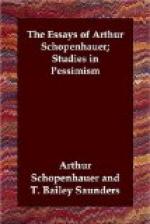It occasionally happens that, for no particular reason, long-forgotten scenes suddenly start up in the memory. This may in many cases be due to the action of some hardly perceptible odor, which accompanied those scenes and now recurs exactly same as before. For it is well known that the sense of smell is specially effective in awakening memories, and that in general it does not require much to rouse a train of ideas. And I may say, in passing, that the sense of sight is connected with the understanding,[1] the sense of hearing with the reason,[2] and, as we see in the present case, the sense of smell with the memory. Touch and Taste are more material and dependent upon contact. They have no ideal side.
[Footnote 1:_Wierfache Wurzel_ sec. 21.]
[Footnote 2: Parerga vol. ii, sec. 311.]
* * * * *
It must also be reckoned among the peculiar attributes of memory that a slight state of intoxication often so greatly enhances the recollection of past times and scenes, that all the circumstances connected with them come back much more clearly than would be possible in a state of sobriety; but that, on the other hand, the recollection of what one said or did while the intoxication lasted, is more than usually imperfect; nay, that if one has been absolutely tipsy, it is gone altogether. We may say, then, that whilst intoxication enhances the memory for what is past, it allows it to remember little of the present.
* * * * *
Men need some kind of external activity, because they are inactive within. Contrarily, if they are active within, they do not care to be dragged out of themselves; it disturbs and impedes their thoughts in a way that is often most ruinous to them.
* * * * *
I am not surprised that some people are bored when they find themselves alone; for they cannot laugh if they are quite by themselves. The very idea of it seems folly to them.
Are we, then, to look upon laughter as merely O signal for others—a mere sign, like a word? What makes it impossible for people to laugh when they are alone is nothing but want of imagination, dullness of mind generally—[Greek: anaisthaesia kai bradutaes psuchaes], as Theophrastus has it.[1] The lower animals never laugh, either alone or in company. Myson, the misanthropist, was once surprised by one of these people as he was laughing to himself. Why do you laugh? he asked; there is no one with you. That is just why I am laughing, said Myson.
[Footnote 1: Characters, c. 27.]
* * * * *
Natural gesticulation, such as commonly accompanies any lively talk, is a language of its own, more widespread, even, than the language of words—so far, I mean, as it is independent of words and alike in all nations. It is true that nations make use of it in proportion as they are vivacious, and that in particular cases, amongst the Italians, for instance, it is supplemented by certain peculiar gestures which are merely conventional, and therefore possessed of nothing more than a local value.




